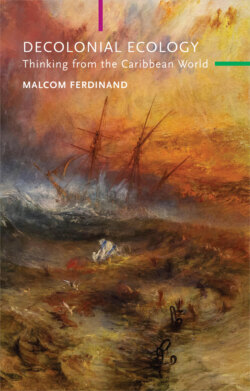Читать книгу A Decolonial Ecology - Malcom Ferdinand - Страница 26
Notes
Оглавление1 1 Dominique Rogers and Boris Lesueur (eds), Sortir de l’esclavage: Europe du Sud et Amériques, XIVe–XIXe siècle (Paris: Karthala, 2018); Myriam Cottias, Elisabeth Cunin, and Antonio Almeida Mendes, Les Traites et les esclavages: perspectives historiques et contemporaines (Paris: Karthala, 2010).
2 2 Carolyn Merchant, Ecological Revolutions: Nature, Gender, and Science in New England (Chapel Hill: University of North Carolina Press, 1989), pp. 26–146.
3 3 Jean-Baptiste Du Tertre, Histoire générale des Antilles habitées par les François (Paris: Éditions Thomas Lolly, 1667), vol. 1, pp. 8–9. I have modified the language here.
4 4 Jean-Baptiste Thibault de Chanvalon, “Moments perdus ou sottisier,” in Voyage à la Martinique, 1751–1756: contenant diverses observations sur la physique, l’histoire naturelle, l’agriculture, les mœurs et les usages de cette isle faites en 1751 et dans les années suivantes, ed. Monique Pouliquen (Paris: Karthala, 2004), p. 261.
5 5 Martin Heidegger, “Building, Dwelling, Thinking,” in Poetry, Language, Thought, trans. Albert Hofstadter (New York: HarperPerennial, 2001), pp. 145–7.
6 6 Cardinal Armand Richelieu, “Commission aux Sieurs d’Esnambuc et du Roissey, capitaines du Roi dans les mers du Ponant, pour établir une colonie française aux Antilles d’Amérique,” 31 octobre 1626, in Du Tertre, Histoire générale des Antilles, p. 12.
7 7 Bernard Grunberg and Julian Montemayor, L’Amérique espagnole (1492–1700): textes et documents (Paris: L’Harmattan, 2014), p. 16. [Translator’s note: An English translation of this papal bull, Inter caetera, is available at https://papalencyclicals.net/Alex06/alex06inter.htm.]
8 8 Carl Schmitt, The Nomos of the Earth in the International Law of the Jus Publicum Europeaeum, trans. G. L. Ulmen (New York: Telos Press, 2006), pp. 86–100.
9 9 Emmanuel Levinas, Totality and Infinity: An Essay on Exteriority, trans. Alphonso Lingis (Pittsburgh: Duquesne Press, 1969), p. 37. [Translator’s note: Translation slightly modified; Lingis translates this as “way of the I.”]
10 10 Enrique Dussel, The Invention of the Americas: Eclipse of “the Other” and the Myth of Modernity, trans. Michael D. Barber (New York: Continuum, 1995), pp. 12–13.
11 11 David Watts, The West Indies: Patterns of Development, Culture and Environmental Change since 1492 (Cambridge: Cambridge University Press, 1987), p. 77.
12 12 Du Tertre, Histoire générale des Antilles, p. 76.
13 13 Watts, The West Indies, p. 154.
14 14 Du Tertre, Histoire générale des Antilles, p. 81. [Translator’s note: Coup de barre literally means “hit of rod” and is used to describe a feeling of sudden fatigue. A similar English idiom would be “hit by a ton of bricks.”]
15 15 Myriam Cottias, “L’Engagement des Blancs aux Antilles,” Revue de la Bibliothèque nationale de France: Outre-mer no. 39 (1991) : 32–6, at p. 35.
16 16 Bartolomé de Las Casas, A Very Short Account of the Destruction of the Indies, trans. Nigel Griffin (New York: Penguin, [1552] 2004).
17 17 Du Tertre, Histoire générale des Antilles, p. 6.
18 18 Jean-Baptiste Delawarde, Les Défricheurs et les petits colons à la Martinique au XVIIe siècle (Paris: Imprimerie René Buffault, 1935), pp. 54–5.
19 19 Louis-Philippe May, Histoire économique de la Martinique (1635–1763) (Fort-de-France: Société de distribution et de culture, [1930] 1972), pp. 70–1.
20 20 William Cronon, Changes in the Land: Indians, Colonists, and the Ecology of New England (New York: Hill & Wang, [1983] 2003), pp. 127–56.
21 21 André-Marcel d’Ans, Haïti: paysage et société (Paris: Karthala, 1987), p. 171.
22 22 “Ordonnance de MM. Les Général et Intendant qui défend aux maîtres de faire vendre du café par leur nègre, du 7 janvier 1734,” in Durand-Molard, Code de la Martinique, vol. I (Saint-Pierre [Martinique]: Imprimerie de Jean-Baptiste Thounes, 1807), pp. 378–9.
23 23 May, Histoire économique de la Martinique, p. 32.
24 24 Ibid., p. 42.
25 25 Translator’s note: Défricheurs literally means “land-clearers” or “fellers” and should be read in relationship to that colonial act of inhabitation. The term is more often translated by the English “pioneer.”
26 26 Du Tertre, Histoire générale des Antilles, vol. II, p. 454.
27 27 Translator’s note: The French word usually translated into English as labor force is main-d’œuvre, literally meaning “work hand.” This has a relationship to the English vocabulary around slavery worth noting, since it is lost in the more abstract “labor force,” as enslaved Black people were often referred to as “hands” in the accounting paperwork and financial discourse of slavers. See Edward E. Baptist, The Half Has Never Been Told: Slavery and the Making of American Capitalism (New York: Penguin, 2014).
28 28 Delawarde, Les Défricheurs et les petits colons à la Martinique, p. 39.
29 29 See Olivier Pétré-Grenouilleau, Qu’est-ce que l’esclavage? Une histoire globale (Paris: Gallimard, 2014); Pétré-Grenouilleau, Les Traites négrières: essai d’histoire globale (Paris: Gallimard, 2004).
30 30 See chapters 3 and 9.
31 31 Gil Scott-Heron, “Who’ll Pay Reparations on My Soul?” recorded 1970, track 13 on A New Black Poet: Small Talk at 125th and Lennox, Flying Dutchman/RCA.
